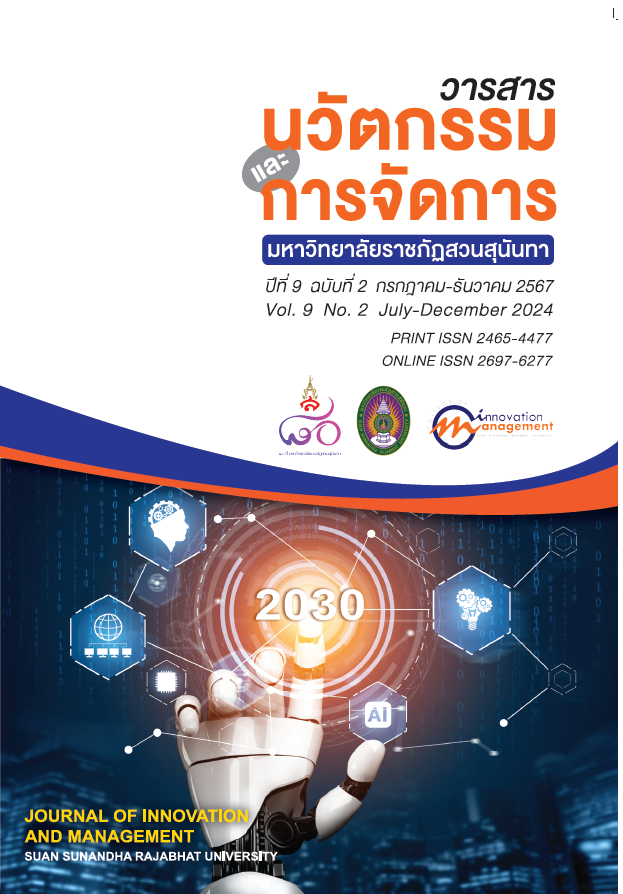Integrative Research: Concept, Types, and Applications
Keywords:
Integrative Research, Multidisciplinary Research, Interdisciplinary Research, Transdisciplinary ResearchAbstract
This academic article aims to study the definition and types of integrative research, as well as to analyze its advantages and limitations. It also offers recommendations for future development of integrative research. The article highlights the importance of integrative research as a tool capable of addressing complex problems in modern society, where many issues require collaboration from multiple disciplines. Examples of integrative research include climate change, health issues, sustainable development, all of which demand perspectives and analyses from various dimensions. Additionally, the article presents case studies from both Thailand and international context, demonstrating the success of integrating knowledge from multiple disciplines. However, despite the advantages of integrative research, there are several limitations that need to be addressed in order to enhance the effectiveness of interdisciplinary collaboration.
References
African Climate Research. (2020). Integrated research for sustainable water management. African Journal of Climate Change, 15(2), 45-60.
Al-Hashimi, F., et al. (2016). Water Conservation in Desert Regions of the Middle East. Journal of Environmental Policy, 6(1), 85-100.
Bank of Thailand. (2021). Sustainable community development project in the northeastern region. Bangkok: Bank of Thailand. (in Thai)
Bryman, A. (2016). Social Research Methods. Oxford: Oxford University Press. Chiang Mai Community
Foundation. (2019). Sustainable community economic development project in Chiang Mai Province. Community Development Journal, 4(2), 112-118. (in Thai)
Choi, B. C. K., and Pak, A. W. P. (2006). Multidisciplinarity, interdisciplinarity, and transdisciplinarity in health research, services, education and policy. Clinical & Investigative Medicine, 29(6), 351-364.
Chulalongkorn University. (2020). Development of dengue vaccine in Thailand. Medical Journal, 12(3), 18-24. (in Thai)
Department of Highways. (2019). Traffic management in Bangkok (Annual report). Bangkok: Department of Highways. (in Thai)
Food and Drug Administration (FDA). (2020). Pfizer-BioNTech COVID-19 Vaccine. FDA.gov.
Garcia, M., and Torres, L. (2020). Sustainable Agricultural Development in the Amazon Rainforest. Journal of Environmental Studies, 14(3), 230-245.
Gupta, R., and Patel, A. (2021). Public Health Improvements in Rural India. Multidisciplinary Journal of Public Health, 9(2), 145-160.
Health Systems Research Institute. (2018). Integration of environmental science, social sciences, and state policy for climate change adaptation. Bangkok: Health Systems Research Institute. (in Thai)
Kasetsart University. (2020). Water management in the northeastern region. Agricultural Research Journal, 45(1), 112-130. (in Thai)
Klein, J. T. (2004). Prospects for Transdisciplinarity. Futures, 36(4), 515-526.
Khon Kaen University. (2020). Sustainable agricultural development in the northeastern region. Khon Kaen: Khon Kaen University. (in Thai)
Lang, D. J., Wiek, A., Bergmann, M., Stauffacher, M., Martens, P., Moll, P., Swilling, M., and Thomas, C. J. (2012). Transdisciplinary research in sustainability science: Practice, principles, and challenges. Sustainability Science, 7(1), 25-43.
Morse, W. C., Nielsen-Pincus, M., Force, J. E., and Wulfhorst, J. D. (2007). Bridges and barriers to developing and conducting interdisciplinary graduate-student team research. Ecology and Society, 12(2), 8.
Murakami, H., et al. (2017). Earthquake Disaster Management in Japan. Journal of Natural Disaster Science, 8(2), 195-210.
National Research Council of Thailand (NRCT). (2018). Water management in agricultural areas in the northeastern region: Enhancing efficiency in agricultural water management. Bangkok: National Research Council of Thailand. (in Thai)
Office of Natural Resources and Environmental Policy and Planning. (2018). Flood management in Nakhon Si Thammarat Province. Water Resources Management Journal, 6(1), 45-52.
Repko, A. F., and Szostak, R. (2021). Interdisciplinary Research: Process and Theory. SAGE Publications.
Rosenfield, P. L. (1992). The potential of transdisciplinary research for sustaining and extending linkages between the health and social sciences. Social Science & Medicine, 35(11), 1343-1357.
Smith, J. A., and Thompson, R. (2018). Interdisciplinary perspectives on sustainable energy management in North America. Renewable Energy Reviews, 93, 130-145.
Singapore Smart Nation. (2019). Smart Nation: The Way Forward. Singapore: Singapore Smart Nation Programme Office.
Tress, B., Tress, G., and Fry, G. (2005a). Clarifying integrative research concepts in landscape ecology. Landscape Ecology, 20(4), 479-493.
Tress, B., Tress, G., van der Valk, A., and Fry, G. (2005b). Interdisciplinary and Transdisciplinary Landscape Studies: Potential and Limitations. Wageningen UR Frontis Series.
United Nations. (2015). Sustainable Development Goals: Transforming our world. United Nations. [Online]. Retrieved 1 September 2024 from: https://sustainabledevelopment.un.org/
Van Kerkhoff, L. (2005). Integrated research: Concepts of connection in environmental science and policy. Environmental Science & Policy, 8(5), 452-463.
Viratchai, N. & Wongwanich, S. (1998). Synthesis of educational research using meta-analysis and content analysis. Bangkok: Office of the National Education Commission, Office of the Prime Minister. (in Thai)
World Health Organization (WHO). (2018). Global Health Initiative: Tackling AIDS through Integrated Research. WHO Reports.
Wongwanich, S. and Viratchai, N. (2000). Factors and processes facilitating individual moral development for collective success among university students: A quantitative and qualitative study. Bangkok: Department of Educational Research, Chulalongkorn University. (in Thai)
Zhang, X., Li, Z., and Wang, Y. (2019). Multidisciplinary approaches to urban air pollution reduction in China: A comprehensive review. Environmental Science & Policy, 101, 1-8.
Downloads
Published
How to Cite
Issue
Section
License
Copyright (c) 2024 Journal of Innovation and Management

This work is licensed under a Creative Commons Attribution-NonCommercial-NoDerivatives 4.0 International License.
See Publication Ethics https://so03.tci-thaijo.org/index.php/journalcim/Ethics






